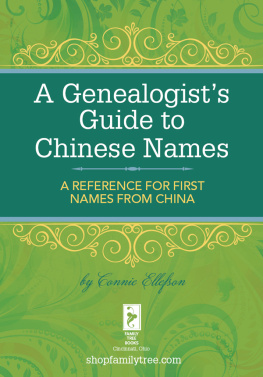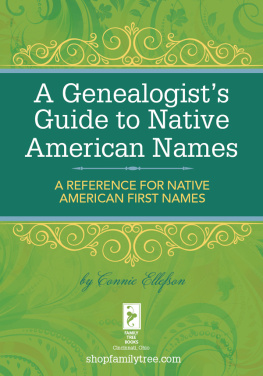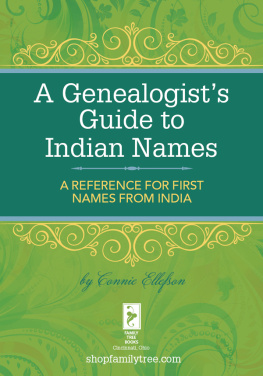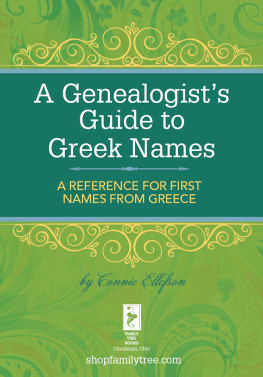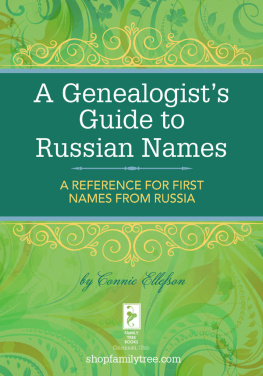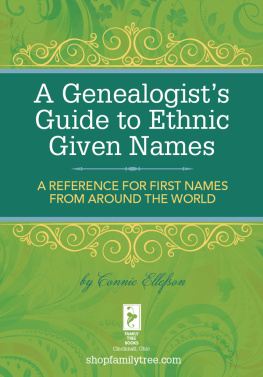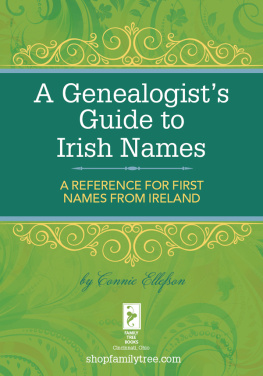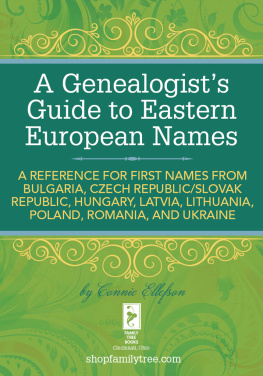A Genealogists Guide to French NamesA REFERENCE FOR FIRST NAMES FROM FRANCEby Connie Ellefson
Cincinnati, Ohio shopfamilytree.com
France
History
The earliest immigrants from France were trappers who headed into the untamed interior of the U.S. to trade with the Native Americans. In the seventeenth and eighteenth centuries, they established trading outposts at present-day Detroit, St. Louis and New Orleans. Beginning in 1538, reaching a peak in 1685, and continuing until the 1760s, a total of 14,000 French Huguenots (Protestants forbidden to practice their religion in officially Catholic France) immigrated to the U.S., settling in all thirteen colonies, especially South Carolina and Massachusetts. In striking contrast to other immigrant countries, France has sent America immigrants at a stable, almost non-varying low rate since records were first kept in 1820.
Before then, an estimated few hundred French migrated here each year in the seventeenth and eighteenth centuries. Since then, it has ranged from a low of 39,000 in the 1940s to a high of 77,000 in the 1840s. The peak immigrant year was 1851 during the California Gold Rush when 20,000 came here. The 1840s, when Germany, Ireland and others were beginning large-scale immigration to America, brought a downturn in population in France as well as a rise in the standard of living. Many of the people who did immigrate were from border areas, such as Alsace, Savoy and the Pyrenees (Basque), which had at different times been traded back and forth as the spoils of war or were not always culturally integrated with the mainstream of French life. For ordinary Frenchmen, when times got bad, they usually migrated to Paris or stayed home.
Another unique feature about France that kept emigration at low levels was the amazing stability of population. In 1850, it was thirty-six million; in 1940, it was forty million. If at some periods it hadnt absorbed more immigrants compared to its size than the U.S., the population might actually have declined. Also, the rate of industrial growth in France was always modest, so there was not a rapid dislocation of society. The immigrants from France have come almost exclusively as individuals rather than as groups. with possibly 30,000 to 40,000 before that. with possibly 30,000 to 40,000 before that.
However, these figures are extremely hazy; the numbers of genuine French immigrants may be as little as half these amounts. The method of recording immigration to the U.S. by country of last domicile resulted in many refugees from Germany and Eastern Europe who had stopped briefly in France being counted as French.
Naming Traditions
In earlier times, it was the custom in France to name a child after the saint who was celebrated on the childs day of birth. So rigid was this custom that a birth registration clerk might record the childs name as the saint name regardless of what name the parents had chosen. Needless to say, this custom has loosened up! There appears to be a definite stratification in French society regarding which names are most popular in the different social classes.
The upper class selects mostly traditional names that have withstood the test of time, such as Anne, Cecile, Helene, Pierre, Vincent, Francois. Farmers also pick traditional names, but they stay away from upper class names. Favorites include Sylvie, Beatrice, Nadine, Maryse, Sebastien, Joel, Jerome and Damien. It is among the middle class and blue-collar workers that trendy names, nowadays characterized by the Anglo-American influence, are popular, such as Cindy, Jennifer, Vanessa, Anthony, Gregory, Jonathan and Kevin (all pronounced the French rather than the English way). In the 1990s, the predominance of ie-ending names for girls is expected to fade and be replaced with ine names, such as Pauline and Marine and ene or aine sounds like Charlene and Laurene.
Pronunciation
a = ah as in ball = a as in fat ai = e as in peck ain, aim, ein, in, im = anh as in thank, but final sound is nasal, as if an n is pronounced without touching the tongue to the roof of the mouth an, am, en, em = onh as in gong, pronounced nasally au = oh as in note , , , = e as in peck e = eh as in late eu = u as in hurt i = ee as in keep or y as in yes o = oh as in hope oi = wa as in wangle u = oo as in moon = ee with rounded lips ue = u as in curb gn = ny as in canyon ch = sh as in chandelier g = zh as in azure, before e, i, y g = g as in gun, before all except e, i, y
French Female Names
Abelia (H) breath; Abella
Aceline (ahs-LEEN) (Teut) noble; Asceline
Adele (ah-DEHL) (OGer) noble, of good cheer; Adelaide
Adeline (ahd-LEEN) (OGer) noble, kind; Adelinda, Adette
Adrienne (L) of the Adriatic
Agathe (AH-guh-tuh) (Gr) good
Agns (ah-NEHS) (Gr) gentle, pure
Aida help
Aimee (eh-MEH) beloved; Aim, Ami, Amy
Alexandre (a-leks-ANDR) (L) defender of man; Alexine, Alexis, Alexandrine
Algiane (Teut) spear
Alice (OGer) noble, kind
Aline (Teut) all
Alix (Teut) noble; Alex, Alissandre, Lissandre
Amalie (L) industrious, persuasive; Ameline, Amelie, Emeline
Amandine (L) beloved
Amarante flower name
Amde (ah-meh-DEH) love God
Anis (H) grace
Andre feminine for Andrew (Gr) manly
Ange angel; Angle, Angeline, Angelique
Angele (ahnh-ZHEHL) (Gr) messenger
Anne (H) grace; Annelle, Anouche,Annelore, Anneliese, Annie
Antoine (L) inestimable; Antoinette, Toinette, Antonine
Ariane (Gr) very holy one; Ariana
Asceline (Teut) noble
Aude (OFr) old, rich; Auda
Audrey (OE) noble strength
Augustine (L) venerable; Austine
Aure (Gr) soft air, breeze
Aurelie (L) gold
Aurore (L) dawn; Aurora
Aveline (OFr) nut; Avelaine
Axelle (H) father of peace
Babette diminutive of Barbara (L) the stranger
Batrice (L) she blesses
Beline (OGer) goddess
Belle (L) beautiful; Bell, Bellette
Bndicte (L) blest; Bee
Bernadette (OGer) courage of a bear; Bernardine, Bernardina, Bernette
Bertille (Teut) heroine
Bibiane (L) lively
Blanche (L) white, fair
Blanchefleur white flower
Blandine (L) seductive
Brigitte (Celt) strength
Callia (Gr) beautiful
Camille (L) ceremonial attendant
Candide (L) pure white
Capucine (kah-poo-SEEN) cape
Carine dear
Carol song of joy; Carole
Caroline feminine for Charles
Catherine (Gr) pure; Cathelle, Catia
Cecile (L) blind, gray eyes; Cecilie, Ceciliane
Celeste (L) heavenly; Celestine, Celia
Celine feminine for Marcel (L) hammer
Cerise cherry
Chantal song
Charlotte petite, feminine; Charla, Charlene, Charlaine
Christelle (Gr) Christian
Christine (Gr) Christian; Christiane, Kit, Christel, Christelle, Kristell
Claire (L) bright, clear
Next page

